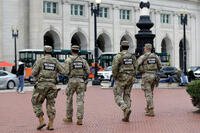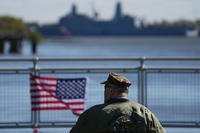The Navy has released a new "playbook" -- a 26 page document -- for mental health that officials say will not only provide commanders with an idea of what resources are available but help dispel any stigma around seeking help.
The playbook's opening lines say that the work of addressing mental health issues "starts with the climate our leaders create and how you lead the people in your care" and notes that "Navy-wide, we must become comfortable with the idea of preventative maintenance for our people."
The release of the new document comes after a year in which the Navy saw several major clusters of suicides and at a time when the service's top brass have admitted that suicide is a major concern.
Read Next: All Combat-Injured Vets Would Keep Their Full Retirement, Disability Pay Under Proposal
Last year, the Navy reported 70 suicides. That figure is the second-highest annual number in more than a decade, according to Navy data.
Rear Adm. Brett Mietus, director of the Navy's Culture and Force Resilience Office, told reporters during a call Monday that "most of all of the resources that are in the playbook have been out there, but they just haven't been put together in a way that [is] easily digestible and then usable by a fleet leader."
Mietus went on to explain that the document "began from us listening to the fleet, and we see it as an answer to questions and concerns that they had," noting that "the number of programs that were out there were ... just a challenge for folks to get their heads around how to do this well."
A recently released investigation into the USS George Washington, an aircraft carrier that has experienced at least nine suicides since November 2019, revealed that the ship had no shortage of sailors seeking help from the four mental health providers onboard -- in fact, the report described it as "overwhelming." Yet, by contrast, a "Deployed Resiliency Counselor" who was available to the crew but at a three-mile walk away from the ship saw barely any sailors.
The playbook lays out the responsibilities of key leaders at every command, including shining a light on the responsibility that senior enlisted members like chief petty officers have in fostering good mental health. It addresses concepts like stigma, personal biases and empathy, while encouraging sailors to have "conversations that matter."
"It is incumbent upon every Deckplate Leader to develop great competence in how best to take care of their people: the minds, bodies, and spirits entrusted to their care," the document said.
Since chiefs are usually a young sailor's first point of contact with leaders and Navy policies, they end up having enormous sway over how any large policy or initiative is implemented.
Force Master Chief Jason Dunn told reporters that he hopes other chiefs note the emphasis that the document places on "conversations before medical care."
"Sometimes, the sailor just needs that conversation -- that kneecap to kneecap -- to have a discussion about what's going on in their lives," Dunn explained.
"The chief's mess is obligated to know their sailors and detect differences and things in a sailor so that they can have that conversation and check on their quality of life and well-being," Dunn said.
"There is no better starting point than going out into your command with an acknowledgement of your own humanity and that of your crew," the document explained.
The document's release comes as the Navy is pushing to make changes in a variety of areas, not just mental health access, to improve sailors' lives.
During a hearing before a House Appropriations subcommittee Tuesday in Washington, D.C., the Navy’s top enlisted sailor, Master Chief Petty Officer of the Navy James Honea, said the primary stressor for active-duty sailors, especially those in operational billets, is "exhaustion," and he asked for a private audience with panel members to discuss reducing operational demand of expeditionary afloat units, which he said would really "draw down on the exhaustion."
Honea took on the top enlisted sailor job in September and since then has been trying to deliver on his promise to be a "problem solver" for sailors in the Navy.
Honea also asked Congress to change the law that prevents junior enlisted personnel from receiving Basic Allowance for Housing. Responding to a question about suicides of sailors assigned to aircraft carriers undergoing overhauls in shipyards, he said that allowing junior sailors to live in town would "help out tremendously" in terms of their quality of life.
"For a sailor that grew up living on ships, I'm telling you, it's not a great place to live. I would ask that we could look at that law, making those changes, so we could afford a greater break from their place of work to their place of home, giving them that separation," Honea said.
Sailors aboard the George Washington -- a ship that was stuck in the shipyard for years – described difficult working and living conditions after much of the crew had been ordered to move back aboard the still-under-construction carrier.
Despite initially being told that there was nothing the Navy could do about living conditions, less than two weeks after news of the suicides became public, the crew was offered a chance to move off the carrier. Rear Adm. John Meier, the officer who oversees the ship, told reporters in May that "if I knew then what I know today, I think we would have clearly delayed [the] crew move aboard."
Mietus explained that the new playbook "is going to meet some of the recommendations that will come out of the investigation" into the suicides aboard the carrier.
Meanwhile, some commands have taken to developing new and innovative ways to get sailors engaged with available resources without a push from top Navy leaders.
In December, Capt. Justin Dowd, the commanding officer of the Southeast Regional Maintenance Center, a command that largely mirrors a similar, troubled center in Norfolk, Virginia, that suffered a cluster of four suicides, proactively developed a forum for his sailors that saw remarkable success.
Dowd told Military.com in an email Tuesday that he was holding another forum again Wednesday.
"I think the important thing for us all is to normalize conversations around [mental health care]," Mietus said.
Veterans and service members experiencing a mental health emergency can call the Veteran Crisis Line, 988 and press 1. Help also is available by text, 838255, and via chat at VeteransCrisisLine.net.
-- Konstantin Toropin can be reached at konstantin.toropin@military.com. Follow him on Twitter @ktoropin.













